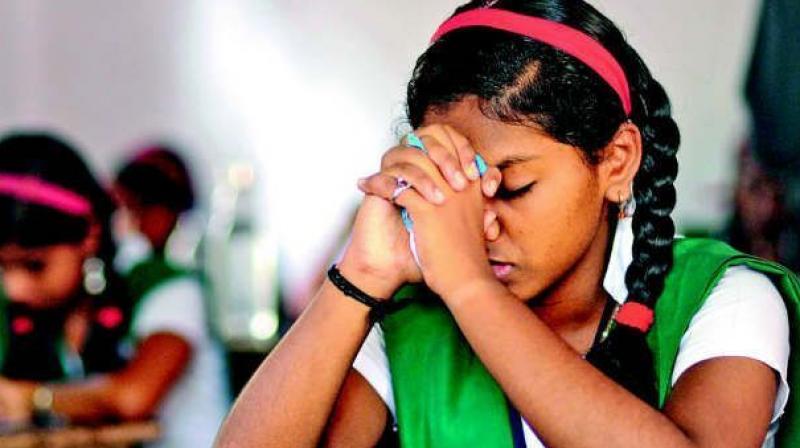Subjected to stress, students develop fake seizure
Doctors say tests come clear, but under-pressure students show all signs of seizure.

Hyderabad: Fake seizures, trembling or pseudo seizures due to pressure from parents, teachers, coaches and even bullying at school or play is being seen in students aged 12 to 20 years by psychologists, psychiatrists and paediatric neurologists in the city.
The numbers increase before exams. In some cases it is found that when the information of the fake seizures spreads, there is mimicking by peers. Clinical data in 20 major hospitals and clinics of the city show that there are at least five children reporting seizures every month and before exams the numbers increase to 10 to 20 per month.
Symptoms of seizures are muscle spasms, limb twitches, mouth twitching and loss of consciousness. In some cases it leads to altered behaviour and inability to recognise family in extreme cases.
Teenagers and children who present themselves to clinics come with symptoms of involuntary shaking, twitching and loss of consciousness. They are usually rushed to the emergency department and stabilized and then consulted by specialists for further treatment.
Dr Anil V. Israni, paediatric neurologist and epileptologist, said, "A seizure is caused when there is fluid imbalance in the brain due to which there is involuntary shaking, twitching and also frothing at the mouth. A proper diagnosis using scans and evaluation of the symptoms is done to understand what is causing the seizure. Of late, we are finding that some seizures are psychogenic non-epileptic seizures (PNES) where there is no imbalance in the brain fluid or electrical activity of the brain. These seizures have deep seated psychological cause.”
According to medical records, the prevalence of PNES is 2 to 33 per 100,000 of general population and often it is a very uncomfortable situation as doctors and healthcare providers have to deal with it very carefully. A senior doctor on condition of anonymity said, “We cannot tell the parents or the child that it is fake; or that stress is leading to this event which features no biological imbalance. We have to be very tactful.”
Most doctors find that patients who approaching them are on anti-anxiety drugs and anti-epileptic drugs. Dr K Srinivas, consultant neuro and addiction psychiatrist, said, “When the patients come to the clinic they are already on drugs which is having an impact on their body and mind. The patients need to be weaned away from drugs to counselling and therapy. This requires a lot of convincing as the family needs to understand why a psychiatrist is becoming a part of the treatment.”
He said that during counselling students speak of stress, how they are not able to cope with expectations, how they are being forced to live a model of life which they don’t want to. “This is a build-up of years and at a point when the body and mind can’t take it any more, there is an outlet in the form of a neurological event,” he said.
Often parents and family members are so scared that they are not able to come to terms with it and extra attention is showered to get the child out of the situation.
How to distinguish Fake seizures
- Epileptic seizures are fits where there is involuntary movement or trembling of the body and in severe cases it also leads to frothing at the mouth. It occurs in patients where there is excessive abnormal activity in the brain and which can’t be controlled by them.
- Psychogenic nonepileptic seizures (PNES) mimic the involuntary movements of the hands, legs and also twitching of the mouth but there is no abnormal activity in the brain. The effect is more because of an underlying psychological disorder leading to this kind of trembling.
- Doctors depend on brain scans to spot non-epileptic seizures. Besides, they examine video recording of conversations on topics which make the patient uncomfortable to test their response. Parents are counselled to closely observe patients before jumping to conclusions.
Case studies
1) A 13-year-old student was made to wake up at 3 am by his parents and taken to the tennis coaching centre for practice. The child was in the top 10 slot at the city level but the parents wanted the top rank.
One day the child had seizures at the tennis court and was rushed to hospital.
After investigations it was found that the seizures were due to the pressure of expectations exerted on him. The child opened up in a separate counselling session with doctors which enabled them to help the child.
2) A Class X student came to doctors with recurrent severe trembling sensation. The parents had changed three doctors, and the symptoms had strengthened despite medication given to the student. Doctors suspected a psychological disorder and evaluated him.
They discovered that he didn’t want to pursue the subjects insisted upon by the parents. Whenever the trembling sensation occurred the pressure eased; even less marks were forgiven.
While this child came in July during the first session of exams, two more similar cases from the same class followed in September and October from the same school.
Psychiatrists and psychologists suspect that word got around and those who wanted solace from the pressure of parents were mimicking the event to save themselves.
3) A 17-year-old college student with a very healthy family background and no pressures reported the same symptoms. It was found that he was being bullied in college.
Unable to cope with it, the teenager had developed severe insecurity in social groups and was very lonely. As the extent of bullying increased, his coping mechanism resorted to seizures.

